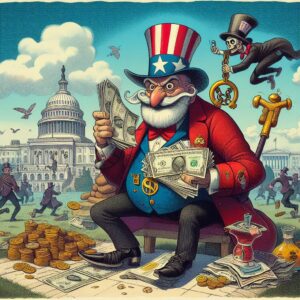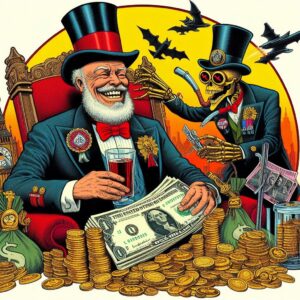ぼったくり男爵とは?
「ぼったくり男爵(ぼったくりだんしゃく)」は、スポーツビジネスや国際スポーツイベントにおいて、特にオリンピックに関連して、利益追求や資金の不透明な使い方が批判される人物や組織を指す、批判的な表現です。この言葉は、もともと主に国際オリンピック委員会(IOC)の高官や、その活動に関与するビジネスマンを批判する文脈で使われることが多いです。
語源と背景
「ぼったくり」という言葉は、日本語で「不当に高い価格を請求する」という意味で使われます。「男爵」は、貴族の称号の一つですが、ここでは「権力者」や「高位の人物」という皮肉を込めて使用されています。したがって「ぼったくり男爵」は、「権力を持ちながら不当に利益を追求する人物」を指す言葉です。
具体的な使われ方
この表現は、特に次のような状況で使われます。
オリンピックや大型国際スポーツイベントにおける不透明な費用
オリンピック開催地が多額の費用を負担する一方で、IOCの高官や関係者が多くの利益を得ることがしばしば問題視されます。これには、競技場建設や運営費用が膨れ上がり、開催国が多額の財政負担を強いられる一方で、IOCやその関連団体が巨額の利益を上げるという不均衡が批判の対象です。
高額な報酬と経費
IOCの高官や関係者が、豪華な待遇や高額な報酬を受け取っていることが問題とされることがあります。これに対して「ぼったくり」として批判が集まり、特に経済的な困難を抱える国や都市でのオリンピック開催時には、住民やメディアから強い反発を受けることがあります。
オリンピックの商業化
オリンピックはもともと「アマチュア精神」や「スポーツマンシップ」を重んじる大会でしたが、近年では商業主義が強まり、テレビ放送権やスポンサー契約が大きな収益源となっています。この商業化の中で、利益を最大化しようとする動きが「ぼったくり」として批判されることがあります。
「ぼったくり男爵」という表現の具体例
この言葉は、特にIOCの会長を務めていたトーマス・バッハ氏に対して使われることがあります。彼が率いるIOCが、日本や他のオリンピック開催都市に巨額の経済的負担を強いているとの批判が、メディアや市民から寄せられました。たとえば、2021年の東京オリンピックでは、COVID-19のパンデミックにより大会の延期や無観客開催が決定され、さらに追加の費用が発生しました。その一方で、IOC側はテレビ放送権やスポンサー契約によって莫大な収益を上げたため、「ぼったくり男爵」という批判が強まりました。
「ぼったくり男爵」は、オリンピックなどの大規模スポーツイベントにおいて、利益を追求し過ぎるIOCの高官や関連するビジネスマンに対する批判的な表現です。特に、開催都市や国が多額の負担を強いられ、経済的なリスクを背負う一方で、主催者側が大きな利益を得る状況が批判の対象となり、この言葉が使われます。
BOTTAKURI DANSHAKU” is a critical term used in the sports business and international sporting events, especially in relation to the Olympic Games, to refer to persons or organizations that are criticized for their profit-seeking and opaque use of funds. The term was originally used primarily in the context of criticizing high-ranking officials of the International Olympic Committee (IOC) and businessmen involved in its activities.
Etymology and Background
The word “botakuri” is used in Japanese to mean “to charge an unreasonably high price. Baron” is one of the titles of nobility, but here it is used ironically to refer to a ‘powerful person’ or ”person of high rank. Therefore, the term “baron rip-off” refers to “a person who has power but pursues profits unfairly.Specific Usage
This expression is used especially in the following situationsUntruthful costs in the Olympics or large international sporting events
It is often a problem that the host city of the Olympic Games bears a large amount of costs while high-ranking IOC officials and others involved receive a large amount of profits. Critics argue that this is due to the imbalance between the inflated costs of stadium construction and operation, which place a large financial burden on the host country, while the IOC and its affiliated organizations make huge profits.High Fees and Expenses
The lavish treatment and high compensation received by high-ranking IOC officials and related parties is sometimes called into question. This has been criticized as a “rip-off,” and can lead to strong opposition from residents and the media, especially when the Olympics are held in countries or cities that are experiencing economic difficulties.Commercialization of the Olympics
The Olympic Games originally emphasized “amateurism” and “sportsmanship,” but in recent years, commercialism has intensified, and television broadcasting rights and sponsorship contracts have become major sources of revenue. In the midst of this commercialization, moves to maximize profits are sometimes criticized as “rip-offs.Specific examples of the expression “rip-off baron”
The term is sometimes used specifically against Thomas Bach, who was the president of the IOC. The media and the public have criticized the IOC under his leadership for placing a huge financial burden on Japan and other Olympic host cities. For example, the decision to postpone or hold the 2021 Tokyo Olympics without spectators due to the COVID-19 pandemic resulted in additional costs. On the other hand, the IOC made huge profits from TV broadcasting rights and sponsorship contracts, which led to increased criticism of the IOC as a “rip-off baron.The term “rip-off baron” is a critical term for IOC officials and related businessmen who pursue excessive profits at large-scale sporting events such as the Olympics. In particular, the term is used to criticize situations in which the host city or country is forced to bear a large burden and financial risk, while the organizers reap large profits.
AIが描いた「ぼったくり男爵」







コメント